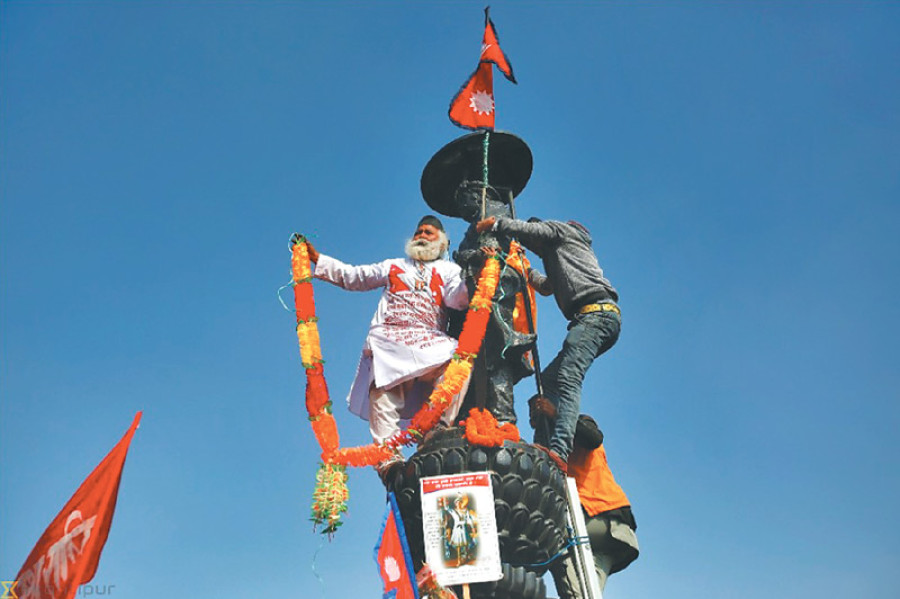Opinion
Liberal blues
Many liberals scrutinise historical events with today’s standards of human rights.
Prashant Sharma
Many liberals scrutinise historical events with today’s standards of human rights. Recently, Nepali newspapers were awash with articles on Prithvi Narayan Shah (1723-1775) and the main point of debate was whether he was the unifier of Nepal or a conqueror whose only motive was to expand his Gorkha kingdom. Some of the reasons why writers think he should be loathed were his inhumane punishments, imposition of his own culture over newly acquired territories and promotion of social exclusion.
The amount of land has traditionally been the yardstick by which to measure wealth. It was therefore common for kingdoms during Shah’s time to conquer each other in order to increase their wealth. It was universally accepted that wealth was ‘zero sum’, which means in order for one kingdom to increase its wealth, others had to lose theirs. Therefore, ruthless conquest of other kingdoms was the only way one could increase one’s wealth. It was not just Shah who wanted to expand his kingdom. It was a global phenomenon and the kingdoms that Gorkha conquered would probably have done the same, if they could have.
Birth of a radical idea
Prithvi Narayan Shah ascended the throne of the Gorkha kingdom in 1743. Thirty-three years later, Adam Smith, who incidentally was born in the same year as Shah, published The Wealth of Nations and shifted focus from ‘land’ as the measure of wealth to ‘the ability to command labour’. It was a radical idea then. Liberals who loathe Shah for conquering other kingdoms are assuming that he would have known our current understanding of economic system and social justice. Recent global incidents like the Russian annexation of Crimea and disputes over the South China Sea reflect how much nations still value land. It can help us imagine the beliefs that Shah or others during his time must have held.
Discussion on liberalism started much later. Intellectuals like John Stuart Mill and Friedrich List, who were born after Shah, promoted the idea of individual liberty started by John Locke, which is the basis of modern liberalism. While liberalism seems natural and alternatives seem unthinkable to many nowadays, it was developed long after Shah’s time. Even the early proponents of liberalism could be seen as evil and worthy of hatred if judged by today’s liberal standards. For example, List talks only about the education of sons and says that anyone who could speak the French language could become a French citizen. I would not be surprised if a few liberals today think he was sexist and was against minorities who did not speak French but wanted to become a French citizen. We can draw a parallel between List’s thoughts and the blame that Shah receives for imposing his culture over other ethnicities.
Deep philosophical question
Marxism has had a significant impact on Nepal’s recent history. Our current prime minister, who claims to be a Marxist, led a decade-long guerrilla warfare that killed thousands. Radical leftists in the country even today use Marxism to analyse Shah’s regime. They detest him and vandalise his statues in public places. In The Communist Manifesto, Karl Marx and Friedrich Engels themselves assert that the history of all hitherto existing societies was the history of class struggles. The thing Nepali Marxists fail to understand is that even if it had not been for Shah, any other ruling class at the time would have controlled the means of production and the situation would not have been much different. Marxism itself did not come out of nowhere. It was developed as a conversation with ideas of other contemporary European philosophers and economists like Smith and List.
Our current views of communism and liberalism are largely the result of ideas that developed in Europe and the US. My point is not that these ideas are invalid or that we should not borrow intellectual ideas from other parts of the world. We should, however, understand that these ideologies that people use to criticise Shah matured a long time after his death, so it is not likely that he would have thought like we do today.
There is no doubt that many of the acts of Shah and other contemporary rulers if carried out today would be unacceptable and evil. But whether the actions that happened before the birth of liberalism were right or wrong is a deep philosophical question answering which may not be as simple as some would like to believe.
People have the right to believe that Shah was not a unifier but a ruthless expansionist. But if one believes that he is not worth remembering for his contribution to Nepal because unification was not his intention, it is worth pondering whether children should be grateful to their parents for raising them or whether they should simply think that their parents were only following their natural instincts in conceiving and raising them.
Sharma studies liberal arts and sciences at New York University




 9.89°C Kathmandu
9.89°C Kathmandu










